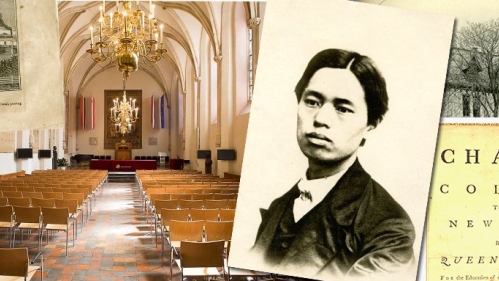
Rutgers' International History
Rutgers was chartered in 1766 as Queen’s College, a private institution affiliated with the Dutch Reformed Church. Queen’s College was renamed Rutgers College in 1825 after philanthropist Colonel Henry Rutgers, a Revolutionary War hero and son of colonists from the Netherlands.
The university’s seal and motto were inspired by those from Utrecht University in the Netherlands. The fourth Rutgers president, John H. Livingston, a student of the ministry at Utrecht University and a key player in establishing Dutch theological education in colonial America, suggested the design in the 1820s.
In the mid-19th century, Rutgers expanded its academic profile to include the sciences and expanded its student body by welcoming its first international students.
Aside from Dutch missionaries living in the land, Japan experienced a 200-year isolationist period that came to an abrupt end in the 1850s after a U.S. fleet navigated into its ports. As a result, Japan’s renewed interest in western activities was born, and in 1866, Rutgers welcomed its first Japanese students, the Yokoi brothers, following the recommendation their teacher and Dutch missionary, Guido Verbeck.
A brilliant samurai, Kusakabe Taro, followed Yokoi brothers to Rutgers just one year later, with aspirations of a career in international relations—beginning with creating a diplomatic connection between the Japanese emperor and the United States. Taro accomplished much at Rutgers, including being the first Japanese student elected to Phi Beta Kappa, but those achievements were, tragically, short-lived. Taro died of tuberculosis just weeks shy of his graduation; he is buried near Rutgers–New Brunswick.
Rutgers continued to achieve many milestones over the next century, and its international student population grew from just a handful to a few hundred— and the university began to not only receive students, but send them abroad. In 1966–1967, the “Junior Year Abroad” program was launched, and the first students went to Tours, France, to study abroad.
More than two hundred and fifty years after its charter date, Rutgers now spans over 30 schools and colleges across three university locations and a large biomedical division, each with globalization integrated into its mission.
In 2011, the university established the GAIA Centers, now known as Rutgers Global, to propel Rutgers to the forefront of the international arena. Rutgers Global ensures that the university attains its full potential as a globally engaged institution of higher education throughout its teaching, research, and service.
